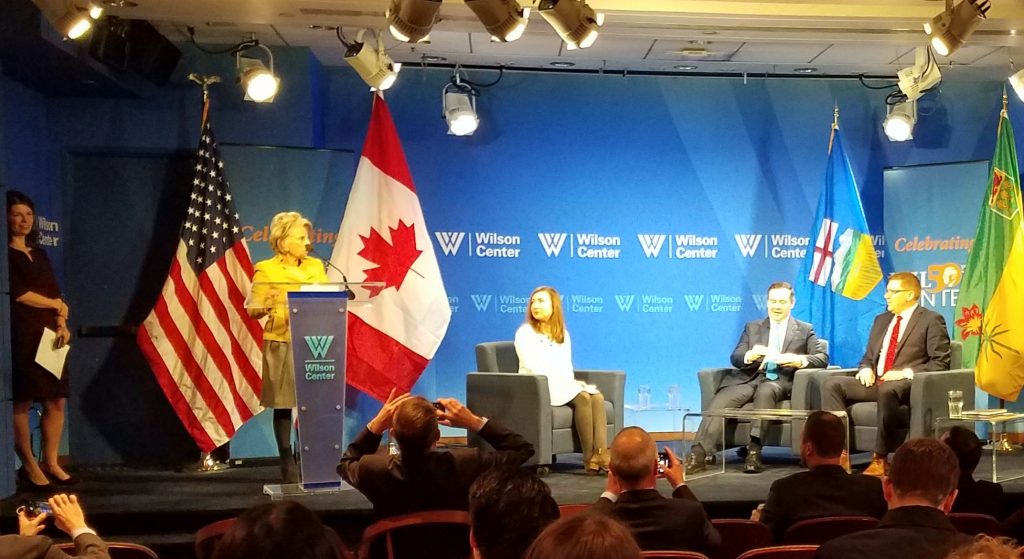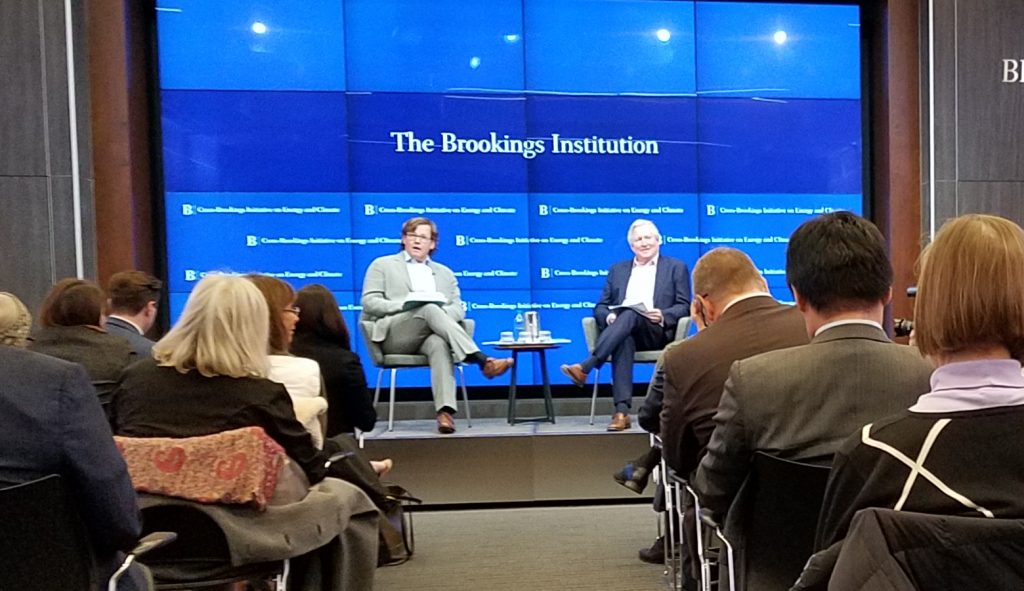
I attended “The Premiers’ Perspective: A Canada-U.S. Relations Outlook for the New Decade” at Wilson Center on February 7, 2020. It was advertised as “a conversation with the Honourable Scott Moe, Premier of Saskatchewan and the Honourable Jason Kenney, Premier of Alberta. The Premiers will speak on how provincial interests play a role in Canada’s vision and presence on the global stage and how topics such as trade, energy, and innovation will shape Canada-U.S. relations in 2020 and beyond” and that was what it was. “Politico” co-sponsored the event and so Luiza Savage Executive Director at “Politico” joined Jane Harman President & CEO, The Wilson Center in welcoming the guests and Lauren Gardner Reporter from “Politico Pro Canada” moderated the discussion. The program lasted about an hour and fifteen minutes.
Jane Harman introduced Chris Sands as the new director of the Canada Institute.
Notes are below.
—
The funniest part of the “Premiers’ Perspective: A Canada-U.S. Relations Outlook for the New Decade” came when Scott Moe, Premier of Saskatchewan seemed to say he disagreed with everything Premier of Alberta, Jason Kenney said, after they agreed on everything else up to that point. What he had in fact that is that “I would JUST agree …” Kenny asked right away, and Moe cleared it up on the spot. Goes to show how misunderstandings happen.
USMCA
Besides what would have been big news, but wasn’t, there was probably little that surprised people familiar with the two leaders, but there was a lot of useful insights and explanations. Saskatchewan & Alberta are especially tightly integrated into the North American market, so it was no surprise that both premiers strongly endorse USMCA. They foresaw no problems getting the agreement ratified by the Federal Parliament and reported that the premiers of all the provinces had come out strongly for the agreement. Jason Kenny said that it was especially important to get ensconced in the North American zone, as there are growing concerns about protectionism in the USA and around the world.
Both agreed that the new USMCA was an improvement over NAFTA, although they did not voice complaints about NAFTA. When asked about concerns about specific products, they mentioned forestry, aluminum and dairy. Softwood lumber exports are important in both provinces. Detailed adjustments can be made within the treaty, so the sooner they get in the better to start the detailed work.
Defer to the Federal Government in international affairs
Both premiers made a point of emphasizing while they want to make the concerns of their own provinces well-known, it is the Federal Government that runs foreign policy and trade negotiations. Jason Kenny added that this is especially important to recall now, given the challenge of China. They don’t want to give the Chinese the impression that they can divide Canadians.
Huawei dispute hurts
Western Canada has been hurt by the Huawei extradition dispute. When the USA and China have disputes, Canada suffers collateral damage. Scott Moe mentioned harm done to potash exports from his province, as well as general agricultural products. Beef and pork restrictions have also hurt, but the thorniest problem might be the canola ban. They did not explain.
Speaking about China tensions, Jason Kenny said that there was more than two Canadians (Former diplomat Michael Kovrig and entrepreneur Michael Spavor) imprisoned related to diplomatic dispute surrounding the Huawei extradition. He made special mention of Huseyin Celil, a Canadian citizen and former Uighur activist who has been imprisoned in China for 13 years.
Energy
Both provinces are producers of raw materials and especially energy and this is the biggest bone of contention between these provincial and the Federal authorities. Some of it has to do with the provinces thinking that they pay too much to the Federal Government, but more of it is related to policies that restrict, or at least do not encourage, energy exploration and transportation.
Pipelines and transporting energy
Scott Moe characterized their concerns “the three Ts”: taxes, trade and transportation. Jason Kenny said that he must assume that the Trudeau government is in favor of the Trans Mountain Pipeline, since the Canada Development Investment Corporation (CDIC), accountable to the Canadian Parliament, acquired the responsibly in 2018. He explained that Canada’s Federal Court of Appeal cleared the way by ruling against challenges from First Nations groups concerned about the environmental impacts of the project. [The Trans Mountain expansion would add more than 600 miles to the pipeline and increase its capacity from 300,000 barrels per day to 890,000.] The government has a duty to consult indigenous people, but this does not imply their power to veto a project.
Kenny regretted the Obama decision to stop the Keystone XL pipeline and implicated the new (at the time) Trudeau government. He suspected the there was at least a tacit agreement by Trudeau not to kick up a fuss. Kenny believed that the veto violated the spirit if not the letter of NAFTA.
Scott Moe went on to explain the importance of pipelines. No form of energy exploration or transport is risk-free but moving oil by pipeline is by far the safest, compared with alternatives such as rail and trucks. Beyond that, moving oil by rail gets in the way of other commodities, such as potash, timber and other agricultural products.
The Keystone XL pipeline is beneficial for international interests, Jason Kenny added. It will produce billions in revenues, create jobs and enhance closer relationships between the USA in Canada. It also creates jobs in the USA as far away as the Gulf Coast, where refiners are tooled to refine heavy crude, no longer so easily available from Venezuela.
North American energy
Scott Moe pointed out that North American energy is important for geopolitical as well as straight economic reasons. We are transitioning from oil to renewable or other non-fossil forms of energy. This transition will take some time, but when it happens much of the world’s oil will become a stranded resource. It is better if the last useful barrels of oil come from North America and that if the resource is stranded, better it be stranded elsewhere. Until then, current demand will be satisfied from somewhere. North American energy is more secure and extracted in more ecologically friendly ways than in places where environmental protection is viewed with somewhat less enthusiasm.
Science-based regulation
Both premiers advocated a science-based regulation process. Kenny pointed to his province’s $30/ton tax on industrial carbon tax as part of his government’s commitment weaning the world off fossil fuels. [The tax went into effect on January 1, 2020 and is the centerpiece of Premier Jason Kenney’s climate strategy. The tax could increase in future years to keep pace with the federal government’s climate plan for industry. Alberta’s oil sands are included in the tax.]
Don’t mock the people: the rise of populism
In response to questions, the premiers talked about the rise of populism. This factor in all advanced Western countries. Kenny thought that Canada was less affect by this malady (my word) and he credited Canada’s better immigration policies as well as the Canadian energy industry. Canada’s skill-based immigration system matches potential immigrants with Canada’s needs. They integrate much easier into society and are more easily welcomed by Canadians, since they provide useful skills. The other factor, the energy industry, is less direct, but Kenny explained that semi-skilled workers in downsizing industries could move into the booming energy industries, and their related functions. Many have moved some distance from declining eastern areas to the booming prairie provinces.
Kenny recommended former Prime Minister Stephen Harpers 2018 book, “Right Here, Right Now,” that addressed the root causes of populism. When political elites dismiss the concerns of ordinary people or even mock them, they react with populism.
Wexit
Addressing the “Wexit” issue, calls for Alberta to leave the Federation, Kenny said that concerns are genuine and serious, and he would not want it to develop further, but it is mostly talk. Still, polls show that 25-30% of the Alberta population supports Wexit, but that 75-80% understand the concerns.
Canadians first
Both Kenny & Moe emphasized that they thought it important to be Canadians first. They emphasized that it was important that the Federal government run foreign policy and trade negotiations. They singled out Deputy Prime Minister Chrystia Freeland for special praise two separate times and praised the work of Canadian diplomats in Washington. They also referenced section 92 of the Canadian 1867 Constitution that gives significant power to provinces to develop and manage natural resources. Good balance.
Moe and Kenny agreed on most things, in fact it seemed on all things discussed at the Wilson Center meeting, so much so that there was little need to differentiate. Besides getting along very well, they gave the impression of being practical and competent leaders.
A complete video of the program is attached.






